



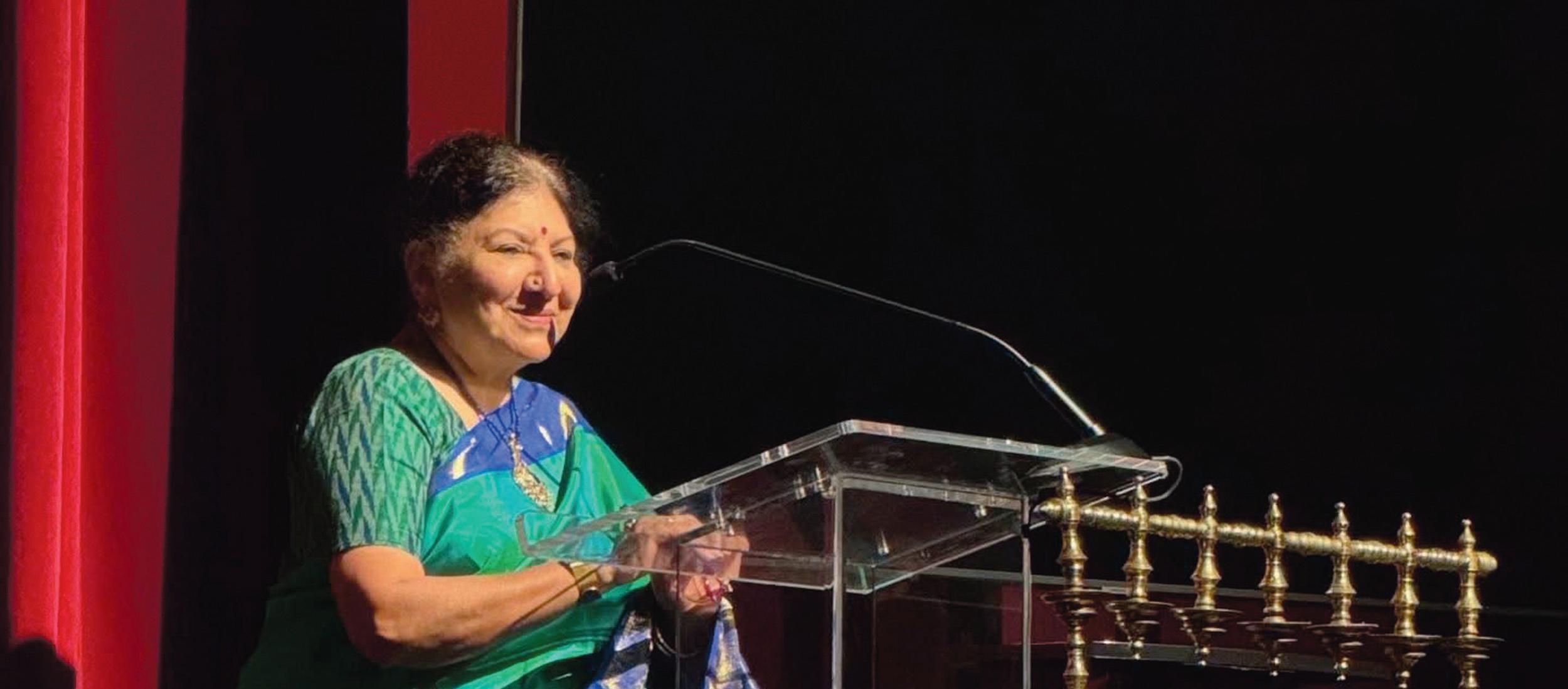


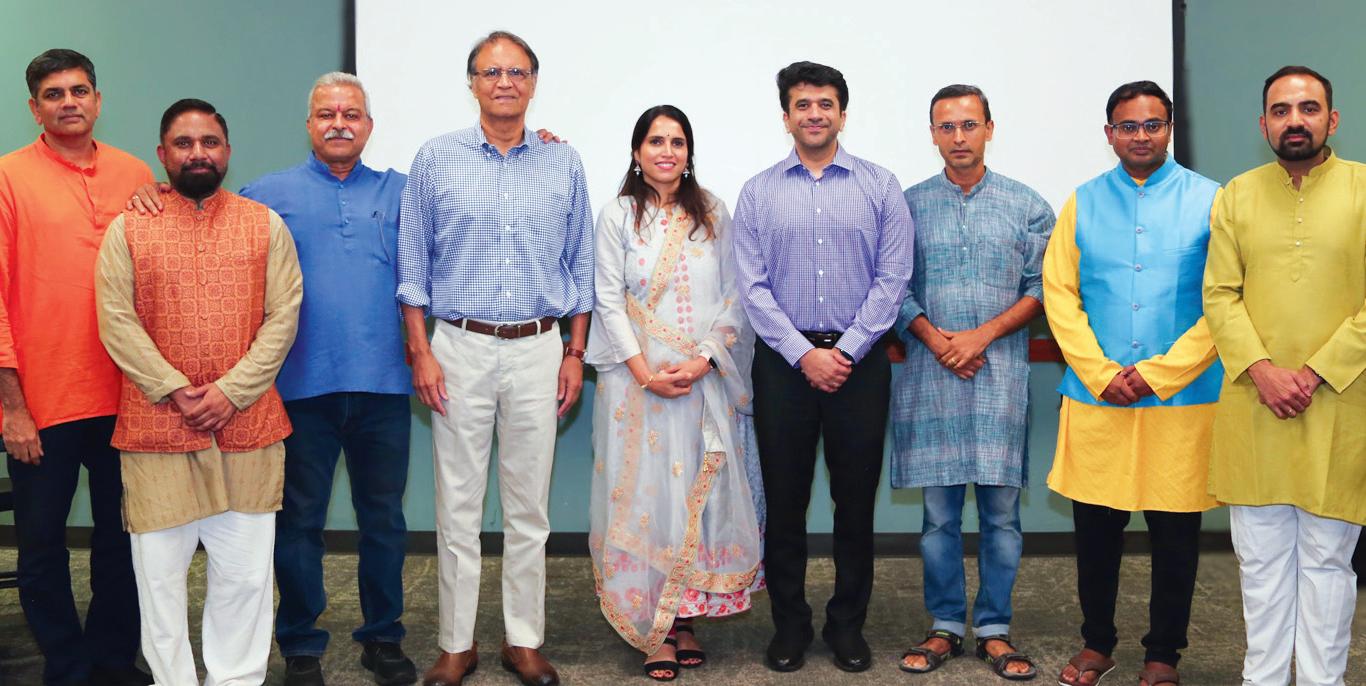
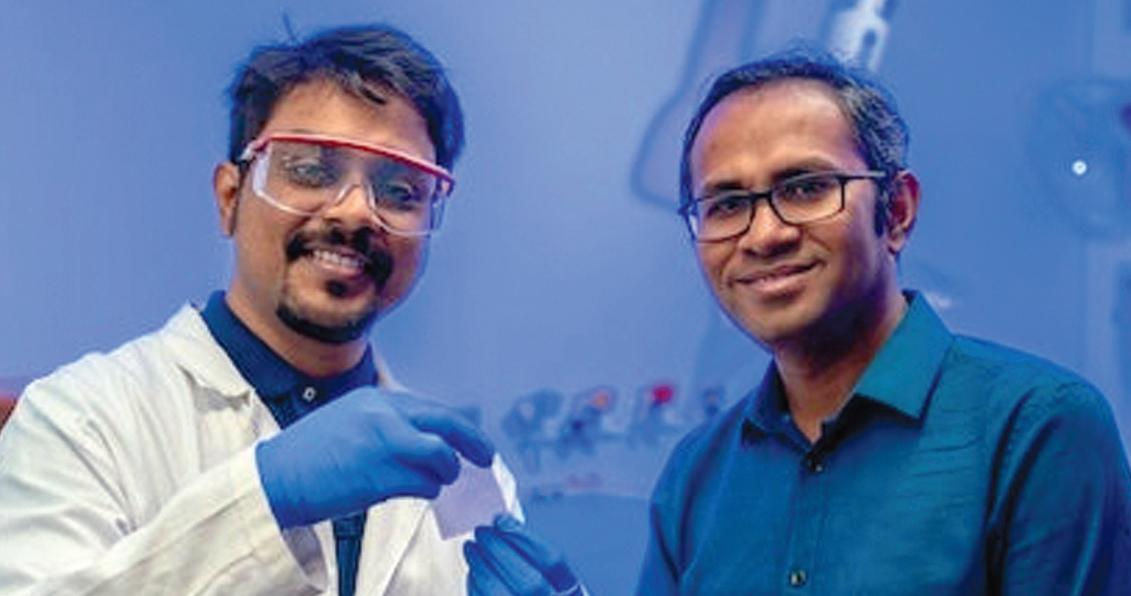

















Dr. Rathna Kumar (center) with official dignitaries
Houston: Anjali Center for Performing Arts -- one of the earliest dance institutes in North America, founded by Dr. Rathna Kumar, celebrated its Golden Jubilee last Saturday, August 2, at the Stafford Centre with thousands of her patrons and well wishers attending to witness the felicitations and dance performances by her past and present students.
India’s Consul General D.C, Manjunath joined Ken Mathew, Mayor of Stafford; Carol McCutcheon, Mayor of Sugar Land; Fort Bend County Judge Juli Mathew to honor this cultural milestone.
CG Manjunath lauded the efforts of Dr. Rathna Kumar, in preserving and promoting India’s classical dance forms and nurturing young talent in the US over the past five decades. The evening featured mesmerizing Indian classicial dance performances.
Rathna Kumar started her dance journey as a 4 year old, and her professional career as a performing solo dancer began at the young age of 9. She has performed all over the world at prestigious events and festivals, and venues such as the Téatre des Champs Elysée, Paris, France.
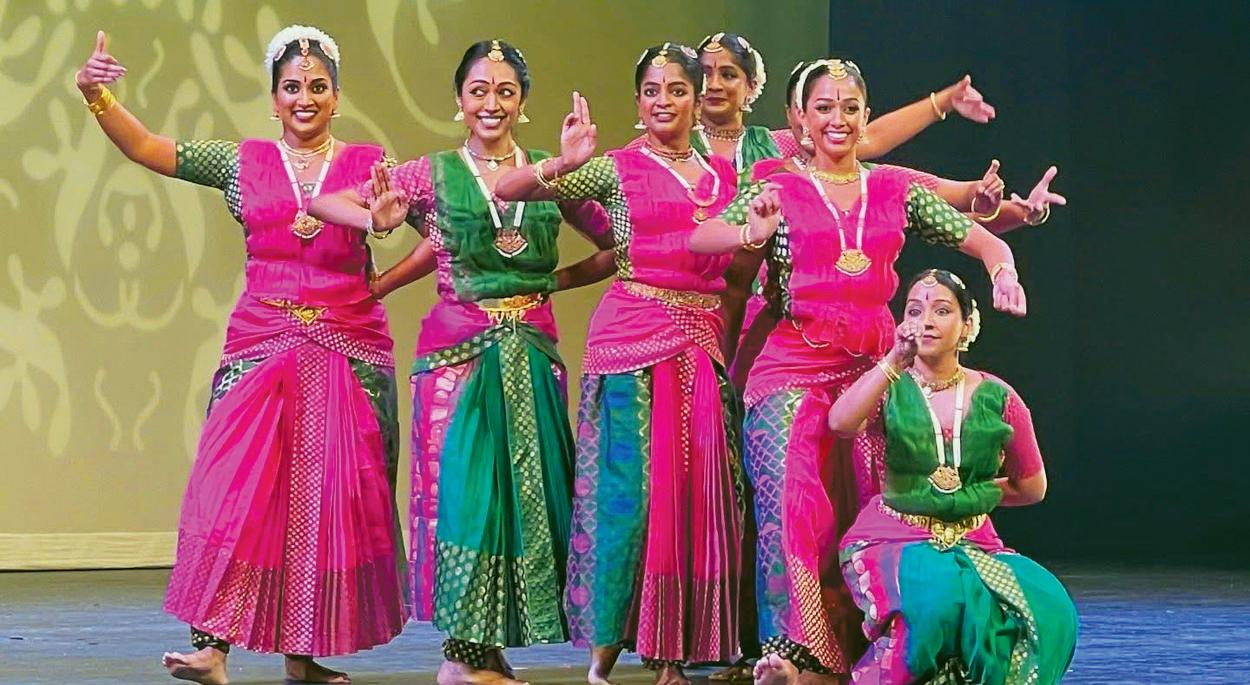

She settled down in Houston, Texas, in 1975, where she established Texas’ first Indian dance institute, ANJALI Center for Performing Arts, also one of the first in North America. Rathna is a reputed performer, choreographer, teacher, arts educator, and cultural ambassador. She is also a scholar, linguist, singer, public speaker and a published author, and has specialized in two classical dance forms, Bharatanatyam and Kuchipudi, which she studied under renowned Gurus K.J. Sarasa and Vempati Chinna Satyam respectively. She has also studied Abhinaya under Mylapore Gowri Ammal and Kalanidhi Narayanan.
Rathna has trained over 3000 students from around the country, choreographed 36 productions and hundreds of dances in several languages, and composed music for others. Her choreography transcends barriers of religion, geography, or language, which is what sets it apart. Her creative teaching methodology has been replicated by many younger teachers of dance who came to the US later. She has developed the mirror-image method of teaching, which is very studentfriendly.
She is also the author of two books on the fundamental techniques of Bharatanatyam and Kuchipudi, with a unique dance notation which she herself created. These books are being used by many teachers both in India and around the world. Rathna, along with her Anjali Dance Company, has taken the traditional dances of India to cities all over the US, Canada, Mexico and the UK. She has been recognized 3 times as an Outstanding Teacher by the National Foundation for the Arts. One of her students won the Texas Young Masters Fellowship (2018) and became a 2019 Presidential Scholar for Dance (Bharatanatyam).
Rathna has served on the Advisory Boards of Miller Theatre, India Culture Center and Sri Meenakshi Temple, on the Boards of Pratham USA, Indo American Charity Foundation and iEducate, has chaired the Mayor’s Arts Task Force on Cultural Diversity, and served as a dance panelist for Houston Arts Alliance, Texas Commission on the Arts and National Endowment for the Arts.


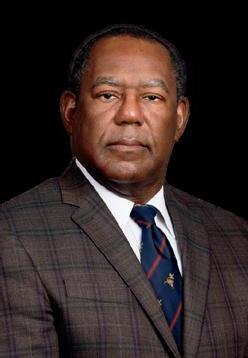
The Houston Press Magazine has called her a “Jewel in the Crown of Houston Arts”. Rathna’s favorite quote – “Everything passes; Art alone, enduring, stays to us” (Agnes de Mille). -- Credits: CGI Houston, Anjali Center website.




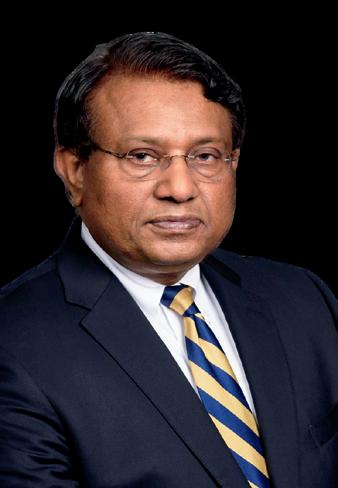





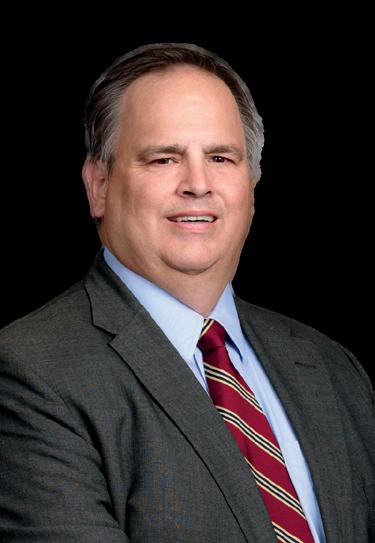











SCAN FOR DIRECTIONS:

By yasHa KausHal
Houston: Every summer, as school winds down and the days grow longer, hundreds of kids across Texas start counting down to one special week: Hindu Heritage Youth Camp, or HHYC. For some, it’s a brand new adventure. For others, it’s a return to a place that feels like ghar or home. Now in its 41st year, HHYC is more than just a summer camp. It’s a community built on laughter, friendship, and the values of their Hindu heritage.
Campers spend the week swimming, playing dodgeball, celebrating Holi, dancing Garba, and just enjoying being kids. But alongside all the fun, there’s something deeper happening. Through daily yoga, Shakha, and education sessions, campers get to explore what it means to live with purpose and pride in their heritage.
A huge part of what makes HHYC so special is the counselors. Many of us grew up at this camp, and now we come back as young adults, excited to give the same experience to the next generation. First-year counselor Hriday Bhutada shared, “As a first-year counselor, it’s been really exciting to see the ways I can make an impact and give back to a community that meant so much to me growing up. I loved going to camp as a kid, and now I love it just as much as a counselor.”
That’s something I relate to completely. I spent six years as a camper, and this was my third year as a counselor. When I was younger, I was on the quieter side, but camp helped me open up. Every year, I’d play a Bollywood song on the piano during the talent show, and I always felt supported and encouraged. I became a counselor because I wanted to help other kids feel that same sense of confidence and belonging.
This summer felt especially meaningful because it was our second year at our very own Texas Hindu Campsite. Having a space that truly belongs to us has brought an even stronger sense of pride and community. This year (2025), we welcomed 168 campers in Junior Camp and 174 in Senior Camp, for a grand total of 342 campers. We were supported by over 80 counselors and around 50 amazing volunteers, many of whom helped prep food under the guidance of our beloved camp chef and everyone’s favorite aunty Sushma Pallod, all working together to make the week smooth, safe, and full of joy.
Behind the scenes, the camp directors led the charge with months of planning and preparation. Every Sunday leading up to camp, counselors met at Gujarati Samaj of Houston (GSH) to plan lessons, brainstorm activities, and make sure every detail was ready. The directors helped guide every step of that process, creating a week
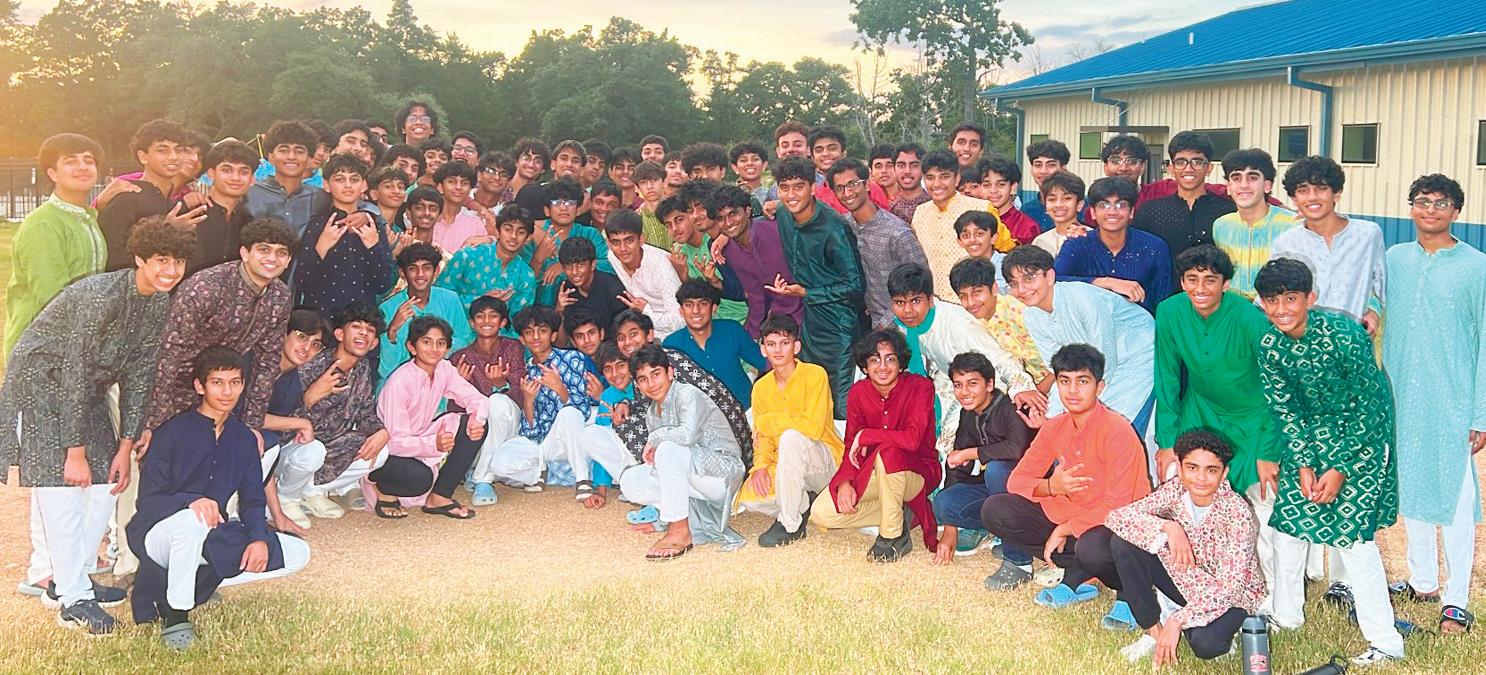
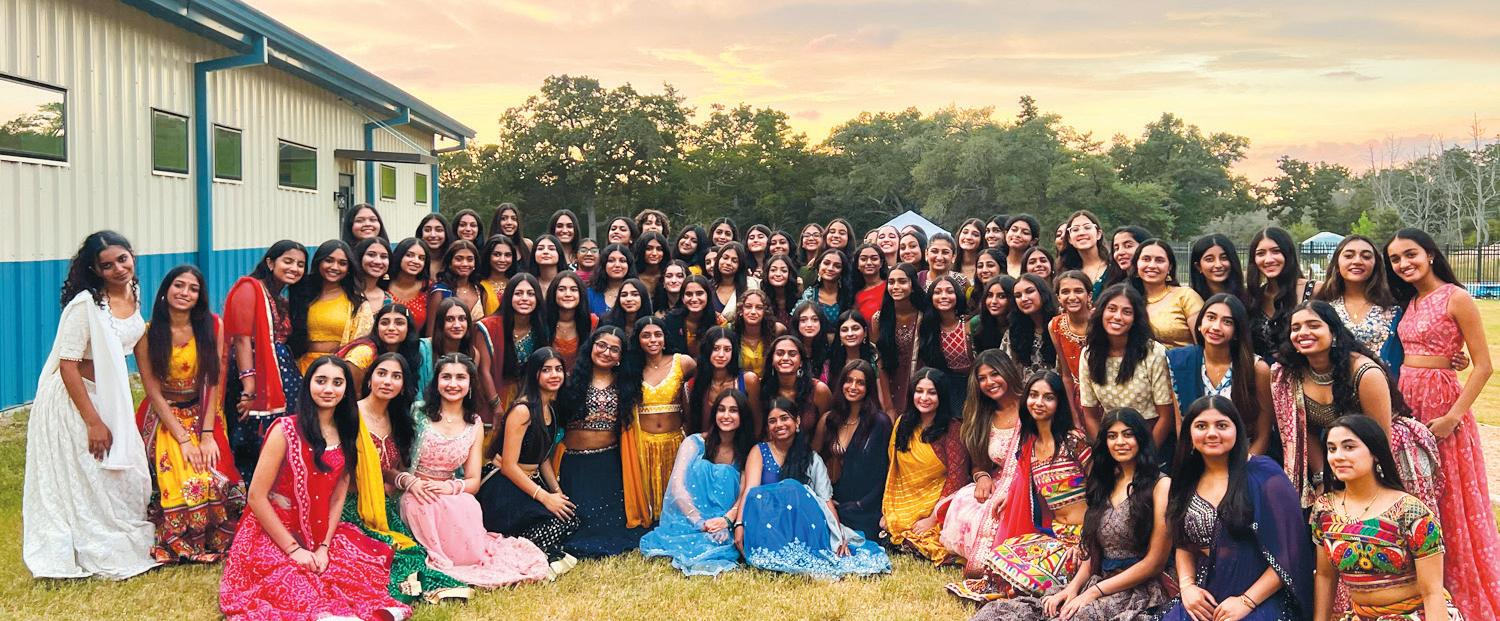
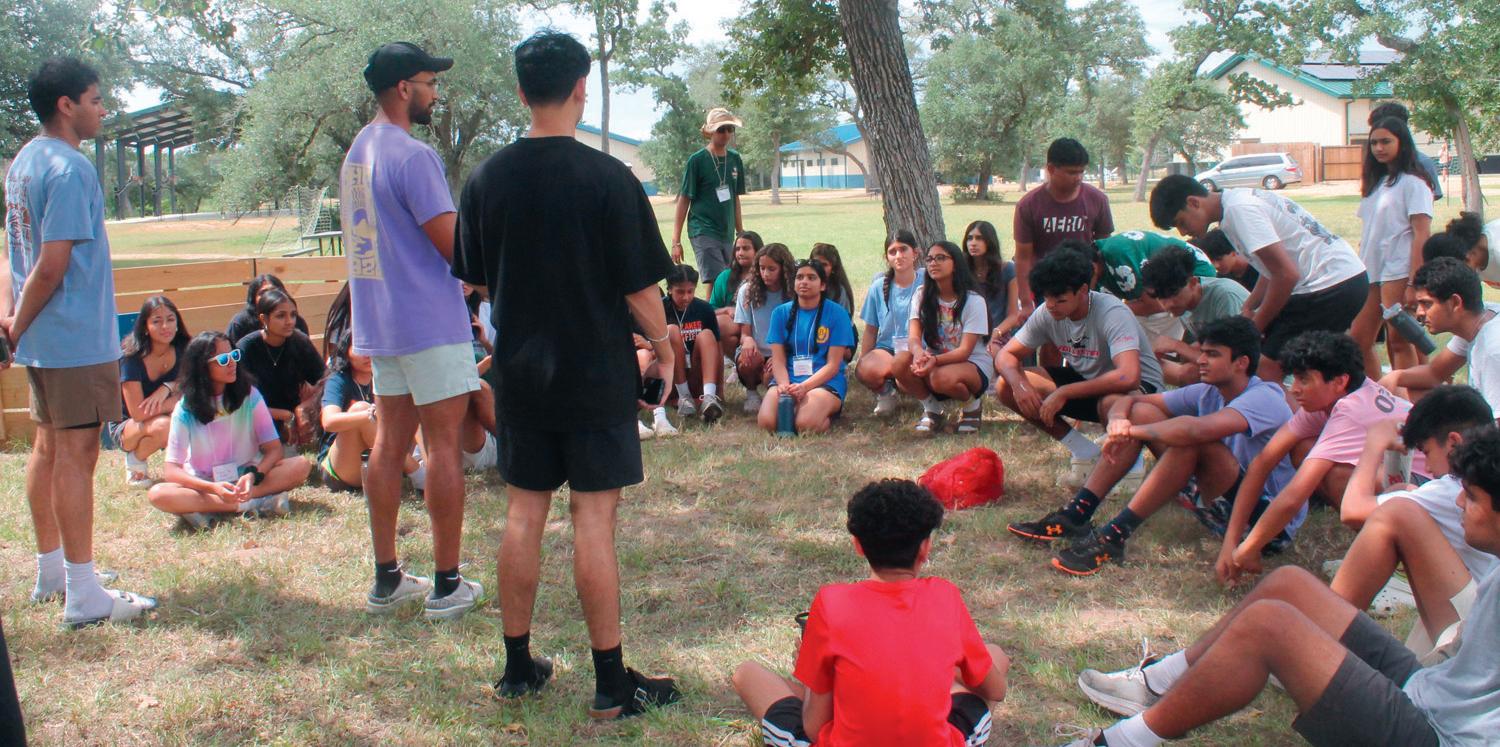
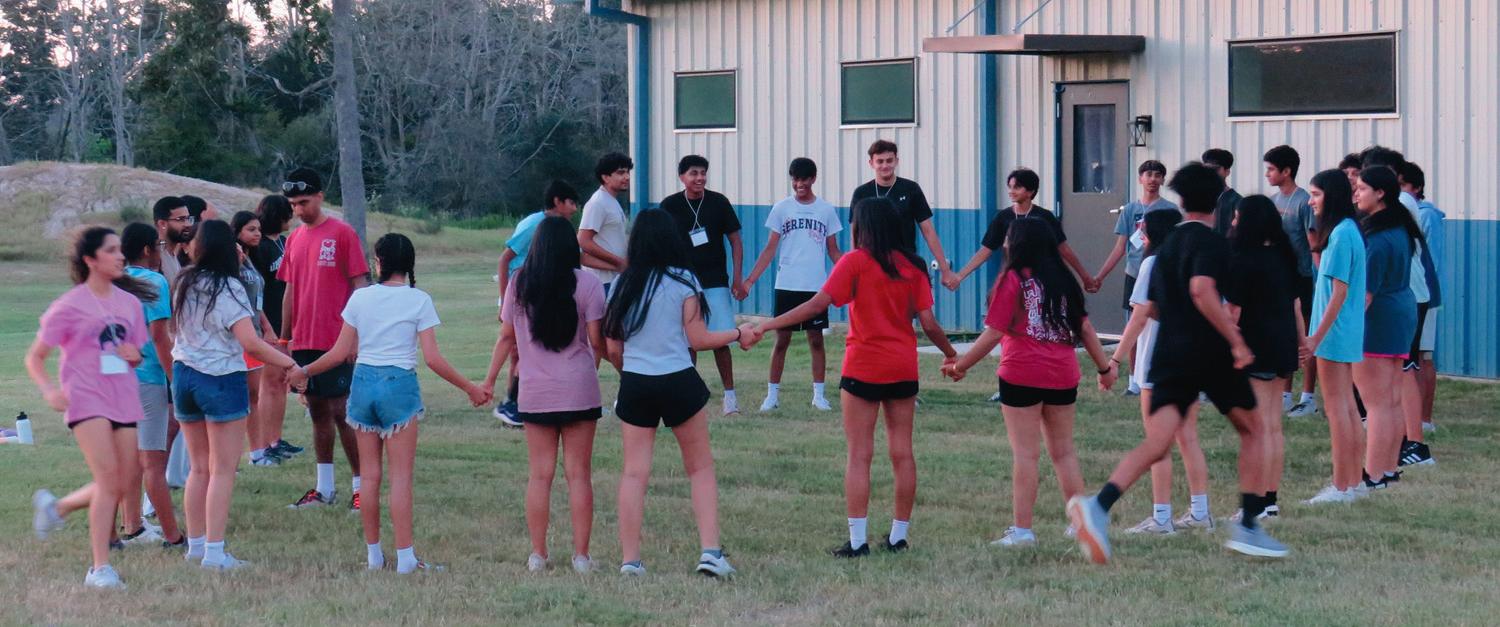
of all our counselors and coordinators, has been incredibly fulfilling. It’s amazing to see how much we have grown over the past couple of years and I know the next generation of leaders in our Hindu community will take it far.”
Throughout the week, campers rotated through various education sessions designed by counselors. Each lesson focused on connecting Hindu principles to real life, in ways campers could truly relate to. For high schoolers, I helped lead an education session on Hindu identity, where we explored how being Hindu in the U.S. can look different for everyone. We talked about the balance between culture and religion, how identity is shaped by both tradition and experience, and how values like karma and ahimsa show up in daily life.
This year, we also had a special education segment on the Kashmiri Pandit community. Anjalie Raina and her son Rohit joined us to share their powerful personal experiences of living in Kashmir, offering a firsthand look at the struggles faced by their community. Their story was both moving and eye-opening, highlighting the importance of preserving history through lived experience. Campers were deeply engaged, asking thoughtful questions and reflecting on how resilience and faith can endure even in the face of displacement.
Outside of education time, every day was filled with team games, connecting with other campers and counselors, and of course, all the camp classics like Skit Night, Garba, and Holi.
And none of this would be possible without the incredible support of the Hindus of Greater Houston, our dedicated volunteers, and the Aunties and Uncles who do everything from cooking delicious meals to serving as camp doctors. Their generosity and behind-thescenes work are what make HHYC feel like home.
In other exciting news, we’re thrilled to announce that next year HHYC is expanding to three full weeks of camp: triple the fun, memories, and magic! We’ll be hosting two weeks of Junior Camp and one week of Senior Camp.
Smit Shah (son of Tejal and Akshay
Shah), and Keshav Shah (son of Nisha and Rajiv Shah), led with clear communication, consistent effort, and strong collaboration. Reflecting on her experience, Srushti shared, “Taking part in
helping lead this camp for the past 6 years has been one of the most rewarding experiences of my life. Working with our dedicated HHYC team including steering committee, volunteers, and most
In the end, HHYC is more than a camp. It’s where many of us found lifelong friends, sometimes even life partners, learned more about ourselves, and deepened our connection to our culture. It’s where kids who may have felt unsure or shy come alive in an environment that celebrates who they are. Whether it’s your first year or your tenth, there’s something about HHYC that stays with you long after the week ends. That’s the magic of this place and why so many of us keep coming back. Visit hinducamp.net for further details.
Yasha is a third-year counselor and rising junior at Texas A&M.
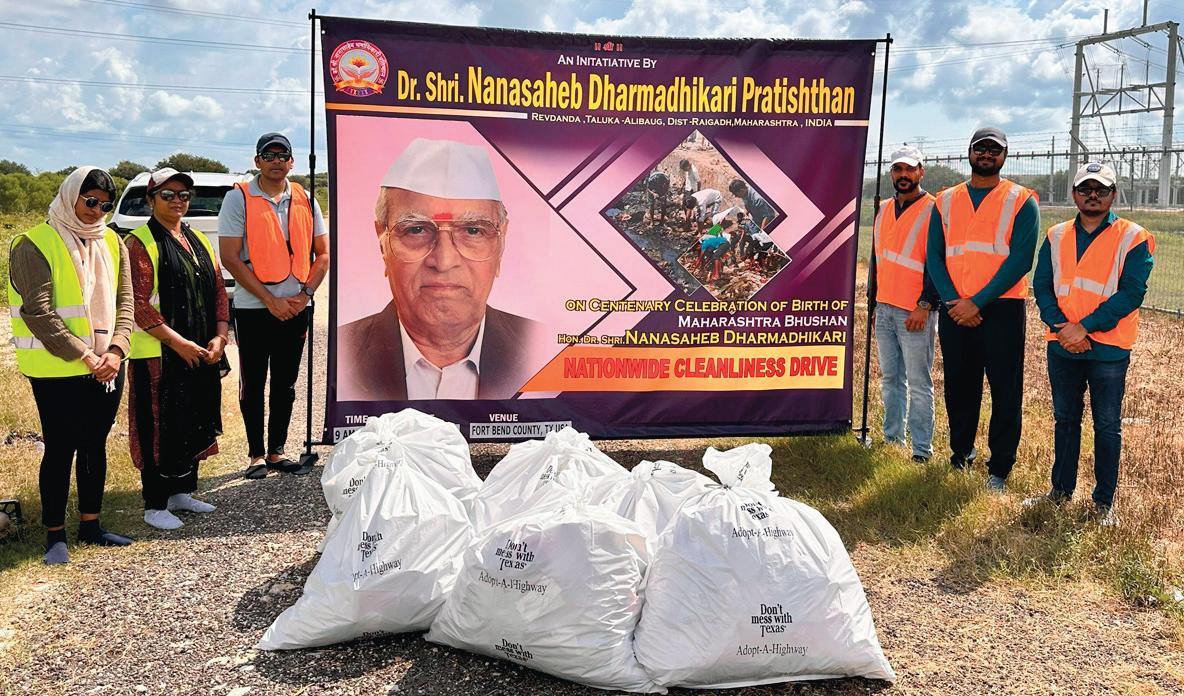
needville: On Aug 03rd ,2025, Texas State residents joined hands as dedicated volunteers of the global nonprofit organization Dr. Shri. Nanasaheb Dharmadhikari Pratishthan (DSNDP), undertaking a Adopt-A-Highway cleanup drive in collaboration with the Texas Department of Transportation(TxDOT) at the Needville, Texas, 77461. This cleanliness drive by DSNDP drew #volunteers at Ford Bend County who collected 7 big size bags of trash between FM 361/FM 1994 upto Seiler Rd resulting in collection of around 105 pounds of waste.
In alignment with the motto “Vasudhaiva Kutumbakam” (The world is one family), DSNDP aims to foster a brighter future by advocating for cleanliness drives in collaboration with the US government by undertaking nationwide cleanliness drives since July 2022. These activities are executed under the guidance of the founders of the organisation Dr. Shri Appasaheb Dharmadhikari and Dr. Shri Sachindada Dharmadhikari.
Earlier in Texas, the organization also carried out 39 cleanliness activities that includes Adopt-a-Road, Adopta-Highway, Storm Drain marking etc. across 8 cities involving a total of 453 volunteers who worked for around 732 volunteer hours, collected 273 bags of waste resulting in approx. 4095 pounds of trash.
Within the North America continent, DSNDP continues to collaborate with 18 states and 74 cities across the United States for nationwide cleanliness drives including 24 different programs such as Adopt-Highway/Park/ Beach/ Street/ River etc. During these cleanliness drives, DSNDP has successfully engaged 3022 volunteers, actively collecting 47250 pounds of trash, resulting in significant cost savings for the government. The organization has received accolades from various state and county governments in the form of 67 certificates and 97 signboards within the nation.
The organisation is also involved in tree plantation across 15 states and 37 cities within the US. DSNDP is also involved in health initiatives such as the Women’s Cancer Awareness Conference successfully hosted in February 2023 and blood/ plasma donation drives in Canada and the United States in recent years. DSNDP also recently organised a Mega Cleanliness Drive and Tree Conservation Event across 21 locations simultaneously to celebrate Earth Day 2024.
For more information, please visit https://www.dsndp. com.

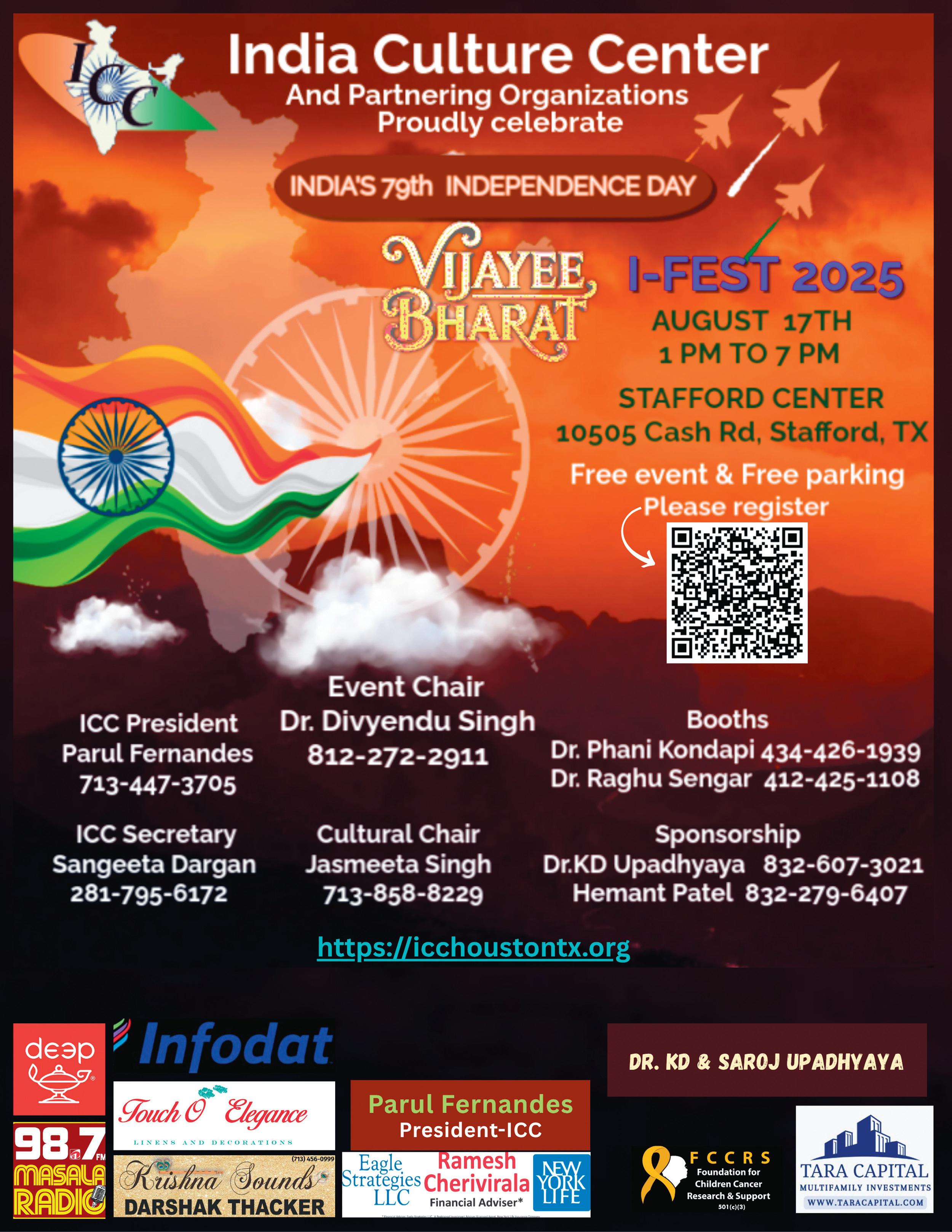
austin: HinduPACT, an American Hindu organization dedicated to advocating for dharmic values and the Hindu ethos in public life, proudly announces the successful launch of its Austin, Texas chapter. The inaugural event, held recently, was met with an overwhelmingly positive reception from the wider community, marking a significant step forward in HinduPACT’s mission to foster inclusion, pluralism, and human rights.

A key highlight of the event was an informative presentation by Rahul Sur, Executive Director of HinduPACT’s Hindus Advancing Human Rights (HAHRI) initiative, a distinguished global leader in social justice reform and former Chief of the United Nations Peacekeeping Evaluation in the Office of Internal Oversight Services (OIOS) at UN Headquarters in New York.
Mr. Sur delivered a thoughtprovoking talk on the “drip, drip Genocide of Hindus in the last 75 years in Pakistan,” offering deep insights from his extensive UN work, including human rights.
Mr. Sur said, “The world has turned a blind eye to the killing, and rape of Hindus and the destruction of temples after Nobel
Prize winner Muhammad Yunus took charge of the government.
Bangladesh’s Hindu population has plummeted from 28% in 1947 to just 7% now. This blatant violation of human rights must end immediately.”
His powerful presentation resonated deeply with attendees, shedding light on the Hindu Genocide that is often suppressed from public consciousness.
The event’s success underscores the growing need for platforms that facilitate open discussion and advocacy on issues vital to the Hindu community. HinduPACT’s launch in Austin signifies a stronger commitment to its mission, empowering individuals to participate in meaningful dialogue and help build a more inclusive and just society.
The launch event served as a pivotal platform to showcase HinduPACT’s key impactful initiatives, each created to tackle significant issues affecting the Hindu community both globally and in the United States.
HAHRI (Hindus Advancing Human Rights): Inspired by the Bhagavad Gita’s call for righteousness, HAHRI champions human rights worldwide. This initiative has been instrumental in raising awareness and taking action against human rights violations, including the formal complaint regarding the “drip, drip genocide” faced by minorities in Pakistan, and advocating for persecuted Hindus in regions like Bangladesh, Kashmir, Afghanistan, and Canada. HAHRI also addresses broader issues of gender equality
and racial justice.
CHINGARI (Coalition for Hindu Girls Abducted and their Rights): CHINGARI is a crucial human rights initiative focused on shedding light on the plight of Pakistani Hindu girls who are tragically abducted, forcibly converted, and sexually abused. Through global awareness campaigns, Chingari urges international action, particularly from the United States, to combat these horrific forced conversions and abductions.
AHAD (American Hindus Against Defamation): Established in 1997, AHAD stands as the pioneering Hindu movement globally dedicated to combating Hinduphobia and the denigration of Hindu scriptures, deities, icons, and cultural symbols across publications,
mass media, and educational materials. AHAD leverages innovative AI methods to detect and counter Hindu hatred and ensure the sanctity of Hindu heritage.
HinduVote: This initiative seeks to integrate dharmic values into the democratic process. HinduVote actively collaborates with temples and community organizations to promote voter registration and education. It plays a critical role in informing candidates and legislators about the Hindu perspective on policy issues, providing American Hindu voters with detailed insights, including candidate questionnaires, feedback, and analyses of key votes and funding.
About HinduPACT:
The Hindu Policy Research and Advocacy Collective (HinduPACT) is dedicated to the advocacy and policy research of issues concerning the American Hindu community. HinduPACT promotes human rights, voter education, and policies affecting American Hindus, aiming for peace and understanding through informed policy initiatives and grassroots advocacy. Visit https://hindupact. org for more details.

wasHington dC: India’s Ambassador to the United States, Vinay Kwatra, on Thursday announced the opening of eight new Indian Consular Application Centres across the United States, aimed at expanding access to consular services for the Indian diaspora.
In a post on X, the Embassy of India in Washington, DC shared a video message by Ambassador Vinay Kwatra: “Announcing major expansion of our Consular Services in the USA beginning August 01, 2025. Here is a message from Ambassador Vinay Kwatra about this expansion and the positive changes it would bring to our service delivery.”
Announcing major expansion of our Consular Services in USA beginning August 01, 2025. Ambassador Kwatra said in his statement that the new Indian Consular Application Centres would be located in Boston, Columbus, Dallas, Detroit, Addison, Orlando, Raleigh, and San Jose.
“In addition, we will also be opening another Indian Consular Application Centre in Los Angeles very soon. With the opening of these new centres, our ability to provide extensive consular services and related delivery capabilities would increase and expand significantly. It would also make the delivery of these services faster and more accessible to our vibrant Indian diaspora.”
He added that starting August 1, all Indian Consular Application Centres would also remain open on Saturdays, which would significantly enhance the availability and accessibility of services. Ambassador Kwatra also announced the streamlining of various miscellaneous consular services, which will now be available through the centres. However, a few key services will continue to be handled from the embassy premises.
“We firmly believe that people-to-people ties are at the heart of the India-US partnership. With the opening of two new consulates in Boston and Los Angeles, as announced by the Prime Minister of India a few months ago, we will further strengthen not just the relationship between our two countries but also our people-to-people ties—particularly in the areas of Boston and Los Angeles.”
According to the Ministry of External Affairs, about 5.4 million people of Indian origin
reside in the US, making them the thirdlargest Asian ethnic group in the country. The Indian diaspora has played a key role in cementing closer ties between India and the United States.
Effective August 1, select Miscellaneous Consular Services will now be handled exclusively by VFS Global’s Indian Consular Application Centers (ICACs) in Houston and Dallas. These services include: POA, birth/marriage certificates, attestations, NORI, PCC, and more. The Houston ICAC is located at 1001 Texas Avanue, Suite 550, Houston, Texas 77002. The Dallas: 8360 Lyndon B. Johnson Freeway, Suite A-230, Dallas, TX 75243. These locations are open Monday to Saturday. For more information, visit: vfs.mioot.com/forms/In/ USA/PS.
Visa applicants are cautioned against using any other website which may appear to represent the Government of India and only use the Government of India portal which is https://indianvisaonline. gov.in/evisa/tvoa.html
Passport used by the applicant should have at least six months validity from the date of arrival in India. The passport should have at least two blank pages for stamping by the Immigration Officer on arrival. The applicant must travel on the passport on which e-Visa has been applied. Entry into India will be allowed on a new passport even if the e-Visa has been granted on the old passport. However, in such cases, the traveler must also carry the old passport on which the e-Visa has been granted.
E-Visa is not available to Diplomatic/ Official Passport Holders or Laissezpasser travel document holders.
E-Visa is not available to individuals endorsed on Parent’s/Spouse’s Passport i.e. each individual should have a separate passport.
E-Visa is not available to International Travel Document Holders.
The e-Visa facility is in addition to the existing Visa services being provided through Indian Embassy and Consulates.
Founder: dr. K.l. sindwani
PuBlisHer: JawaHar MalHotra
editor: PraMod KulKarni
CorresPondent: sanCHali Basu
®All rights reserved. No material herein or portions thereof may be published without the written consent of the publisher. Deadline for advertising and articles is 4 pm on Monday of each week. Please include self-addressed, stamped envelope for return of all unsolicited material. Published at 7457 Harwin Drive, Suite 212, Houston, Texas 77036.Tel:713-789-6397, email: indoamericannews@yahoo.com, website: www.indoamerican-news.com



By ravi dutta MisHra
new delHi: US President Donald Trump’s trade war, which began with the aim of fixing the trade deficit with partner countries, has entered a new phase of economic coercion, with India in the eye of the storm. To force Russia into signing a peace deal with Ukraine and India to agree to stiff US terms in the ongoing trade talks, Trump on Monday widened the tariff war to achieve geopolitical goals by warning India of additional tariffs for profiting from sales of Russian oil amid the Ukraine war.
While New Delhi has called the targeting of India over the purchase of Russian oil “unjustified and unreasonable” and vowed to take “all necessary measures” to safeguard its “national interests and economic security”, Indian exporters are in a fix, scrambling to retain access to the US — their most valuable export market, accounting for nearly 20 per cent of India’s total outbound shipments.
Globally, experts on trade and geopolitics have said the new tariff threats by the US directed at India could undermine 25 years of US-India relations. Trump’s latest threats to India follow the American President’s multiple blunt remarks over India’s association with the BRICS grouping, Apple’s manufacturing operations in India, and, topping it all, the invitation extended to Pakistan’s Army Chief to the White House weeks after the Pahalgam attack and later offering a lower 19 per cent tariff to Pakistan.
However, using economic coercion to achieve geopolitical goals has been a longstanding American policy and is only expanding under Trump. A working paper titled ‘Asphyxiation by Sanctions: Harm, Fear and Smog’ by former Reserve Bank of India governor
Urjit R. Patel calls the US the “hegemonic sanctioner”, arguing that India should view the emerging international financial architecture around BRICS and the Asian Infrastructure Investment Bank (AIIB) as a “risk mitigant” and a rational response to the ever-expanding sanctions regime.
India’s sharp response to Trump’s coercion on Monday comes after the US for decades sanctioned multiple countries for exporting oil, complicating New Delhi’s strategy to diversify its energy imports. Over the years, the US has sanctioned oil exports from Venezuela, Iran, Iraq, Libya, Sudan and Syria. India resumed oil imports from Venezuela in 2023, after a three-year pause, only after the US eased sanctions on the country.
Patel’s paper said out of 1,325 global sanctions since 1949, 486 have been imposed by the US, which currently administers over 30 sanctions programmes — making it responsible for “three times as many sanctions as any other country or international body”.
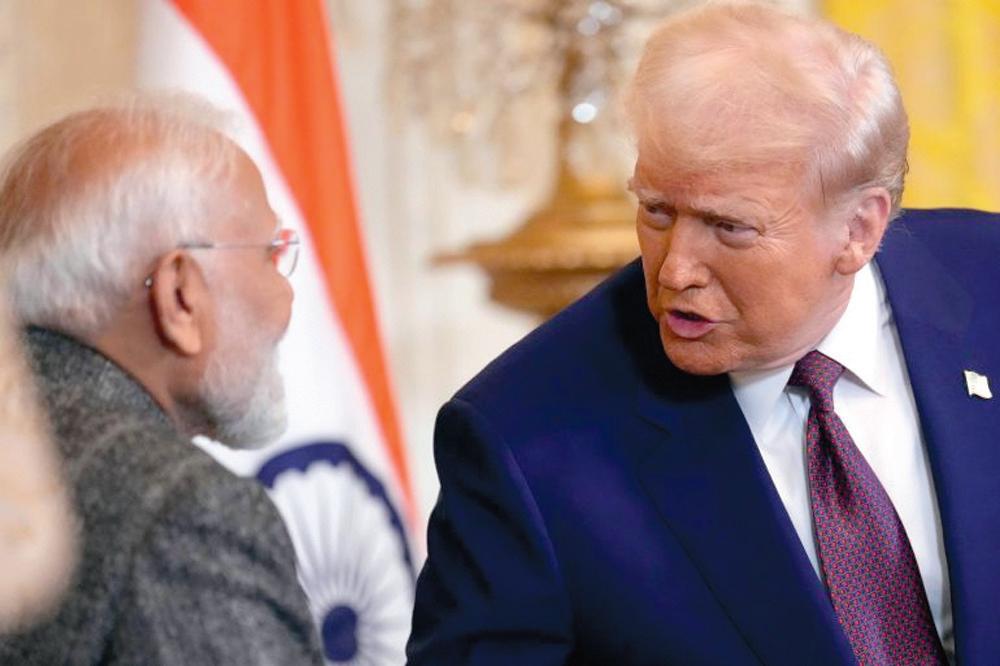
Moreover, US-led sanctions have surged in recent decades, partly due to the collapse of the Soviet Union, the paper said.
Patel wrote that the US has “pioneered secondary sanctions on an industrial scale”, often in coordination with allies such as the G7 grouping and the EU, forming a “posse”. These extraterritorial sanctions are enforced to impede
economic and commercial activity by third countries that would not otherwise violate a primary sanctioner’s rules, he said.
The former RBI Governor wrote that the effectiveness and reach of US secondary sanctions are heavily reliant on the centrality of the American financial system and the US dollar’s status as the global numeraire and principal currency for
settling cross-border transactions. However, the overuse of the US dollar correspondent banking network as a “switch” on payments has prompted many countries to explore alternatives — a trend that could undermine the dollar’s dominance, he warned.
Patel said the US economic sanctions have imposed a significant burden on emerging economies such as India. The hegemonic position of the US means that its sanctions, particularly secondary ones, cause “collateral damage” to third countries — economic losses that are especially severe for emerging economies and often “underappreciated” by the sanctioners.
Patel, who has also served as a Director at the Bank for International Settlements, argues that the imposition of sanctions by hegemonic powers often occurs without adequate public debate or transpar-
ency regarding their costs. Unlike wars, where human and financial costs are evident, the “cost-benefit of sanctions, counter sanctions and secondary sanctions is a black box — the layered and complex scope is a mystery to most”.
The paper also pointed out that US sanctions, particularly on Iran, have directly affected Indian investments. The development and operation of Iran’s Chabahar Port, which involves Indian investment, faced “a hard break” due to initial US sanctions and had “limited operations” after the US reintroduced sanctions in 2018. Even after India signed a 10-year agreement to develop and operate the port in 2024, the US State Department issued a warning about “the potential risk of sanctions” for deals with Iran, creating significant uncertainty and hampering progress. -- IE
Ravi Dutta Mishra is a Principal Correspondent with The Indian Express, covering policy issues related to trade, commerce, and banking.

Houston: Scientists at Rice University and University of Houston have developed an innovative, scalable approach to engineer bacterial cellulose into high-strength, multifunctional materials. The study, published in Nature Communications, introduces a dynamic biosynthesis technique that aligns bacterial cellulose fibers in real-time, resulting in robust biopolymer sheets with exceptional mechanical properties.
Plastic pollution persists because traditional synthetic polymers degrade into microplastics, releasing harmful chemicals like bisphenol A (BPA), phthalates and carcinogens. Seeking sustainable alternatives, the research team led by Muhammad Maksud Rahman, assistant professor of mechanical and aerospace engineering at the University of Houston and adjunct assistant professor of materials science and nanoengineering at Rice, leveraged bacterial cellulose — one of Earth’s most abundant and pure biopolymers — as a biodegradable alternative.
“Our approach involved developing a rotational bioreactor that directs the movement of cellulose-producing bacteria, aligning their motion during growth,” said M.A.S.R. Saadi, the study’s first author and a doctoral student in material science and nanoengineering at Rice. “This alignment
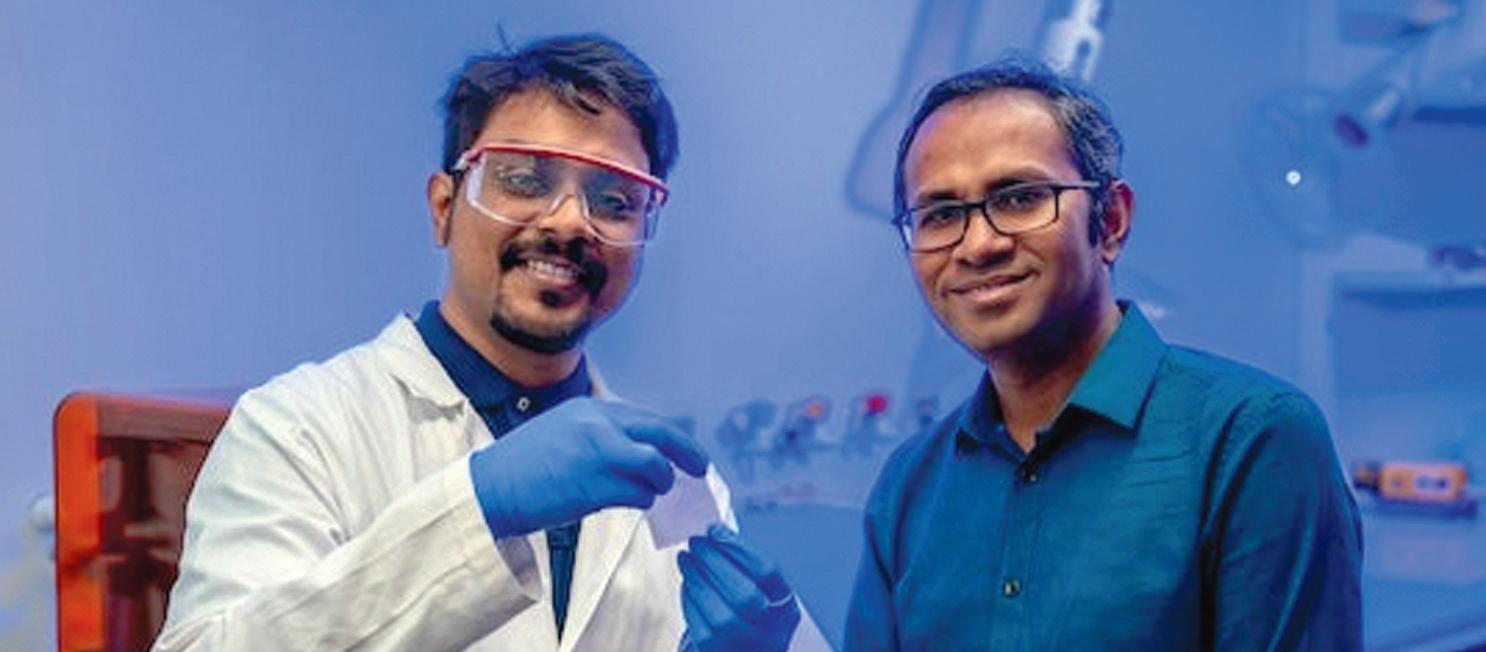
significantly enhances the mechanical properties of microbial cellulose, creating a material as strong as some metals and glasses yet flexible, foldable, transparent and environment friendly.”
Bacterial cellulose fibers usually form randomly, which limits their mechanical strength and functionality. By harnessing controlled fluid dynamics within their novel bioreactor, the researchers achieved in situ alignment of cellulose nanofibrils, creating sheets with tensile strength reaching up to 436 megapascals. Moreover, incorporating boron
nitride nanosheets during synthesis resulted in a hybrid material with even greater strength — around 553 megapascals — and improved thermal properties, demonstrating a heat dissipation rate three times faster than control samples.
“This dynamic biosynthesis approach enables the creation of stronger materials with greater functionality,” Saadi said. “The method allows for the easy integration of various nanoscale additives directly into the bacterial cellulose, making it possible to customize material properties for specific applications.”
Shyam Bhakta, a postdoctoral fellow in the Department of BioSciences at Rice, played an important role in advancing the biological aspects of the study.
Other Rice collaborators included Pulickel Ajayan, the Benjamin M. and Mary Greenwood Anderson Professor of Materials Science and NanoEngineering; Matthew Bennett, professor of biosciences; and Matteo Pasquali, the A.J. Hartsook Professor of Chemical and Biomolecular Engineering.
“The synthesis process is essentially like training a disciplined bacterial cohort,” Saadi explained.
“Instead of having the bacteria move randomly, we instruct them to move in a specific direction, thus precisely aligning their cellulose production. This disciplined motion and the versatility of the biosynthesis technique allows us to simultaneously engineer both alignment and multifunctionality.”
The scalable, single-step process holds significant promise for numerous industrial applications, including structural materials, thermal management solutions, packaging, textiles, green electronics and energy storage systems.
“This work is a great example of interdisciplinary research at the intersection of materials science, biology and nanoengineering,” Rahman added. “We envision these strong, multifunctional and ecofriendly bacterial cellulose sheets becoming ubiquitous, replacing plastics in various industries and helping mitigate environmental damage.”
The research was supported by the National Science Foundation (2234567), the U.S. Endowment for Forestry and Communities (23-JV−11111129-042) and the Welch Foundation (C-1668). Peerreviewed paper: Flow-induced 2D nanomaterials intercalated aligned bacterial cellulose | Nature Communications | DOI: 10.1038/s41467-025 -60242-1







By dHaval roy
Story: The film follows the journey of Nilesh (Siddhant Chaturvedi), a law student from an oppressed caste who falls in love with his classmate Vidhi (Triptii Dimri), an upper-caste girl. Men from Vidhi’s family humiliate and harass him in a bid to protect their so-called honour.
Review: A remake of the Tamil movie Pariyerum Perumal and a sequel to Dhadak, director Shazia Iqbal’s film sets the narrative tone early on with the grim killing of a man for being in a relationship with a girl from an upper caste.
The story then shifts to its protagonists, Nilesh and Vidhi, while touching upon the treatment of students from lower castes by their peers. Nilesh is ridiculed for his English, and a professor unceremoniously throws him out of class after dubbing his admission a “free seat.”
Nilesh reminds us, “Free ki badi keemat chukaani padti hai” (one needs to pay the price for anything free). Alongside their budding romance, the narrative tackles the issue of casteism.
The film delivers several heart-wrenching moments depicting the injustice meted out to oppressed castes—some subtle, such as Vidhi’s father (Harish Khanna) leaving out Nilesh’s surname from the guest list to his elder daughter’s wedding, and others painfully blatant, like Nilesh being smeared with sludge by classmates.
The plot also explores the violence and false allegations people from lower castes often endure. While these incidents are gut-wrenching, the romantic arc between the leads feels underdeveloped.
Written by Iqbal and Rahul Badwelkar, the narrative occasionally feels repetitive as it focuses heavily on Nilesh’s oppression. It also touches on student politics, showing Nilesh’s initial reluctance to get involved and hinting at his change of heart later, but the track fizzles out.

The world of Dhadak 2 is bleak but not entirely black and white.
The college dean (Zakir Hussain), himself from a lower caste, recalls how he was beaten to keep him from studying, yet now influential people seek him out for their children’s admission. Nilesh’s upper-caste friend remains steadfastly by his side.
Despite the intense subject matter, the film finds room for moments of humour that land well.
The pacing is steady and Iqbal’s direction effective, though the final payoff could have been stronger. The narrative builds to a high, but the resolution is abrupt. The music, especially Siddharth–Garima’s soulful Duniya Alag and
Javed–Mohsin’s heartfelt Bas Ek Dhadak, beautifully complements the narrative.
Siddhant Chaturvedi is excellent, capturing the transformation from a meek young man to a self-assured individual. Triptii Dimri is convincing as a naive yet supportive partner, while Vipin Sharma makes a brief but memorable impact as Nilesh’s father.
The film is an engaging and heart-rending watch, though the final resolution feels a touch restrained. It is worth watching for its sincere and sensitive portrayal of an issue that continues to plague society even today, and for a stellar performance by Siddhant Chaturvedi.-- ToI


Place a number in the empty boxes in such a way that each row across, each column down and each 9-box square contains all of the numbers from one to nine.
Send us the correct answer before August 11, 2025. Email us at indoamericannews@yahoo.com. Please send us your solved Sudoku for your name to be published.
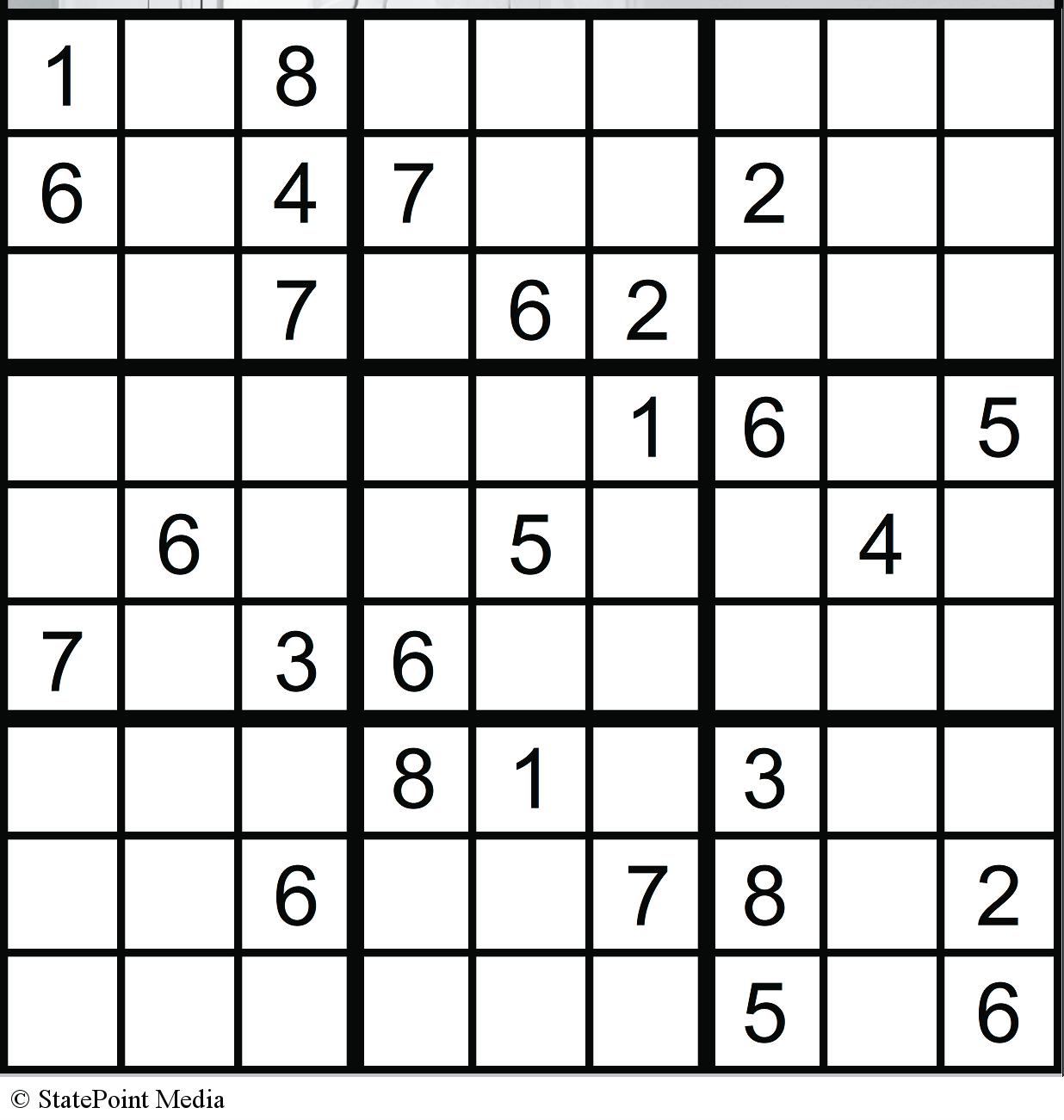
Last Week’s Solution


